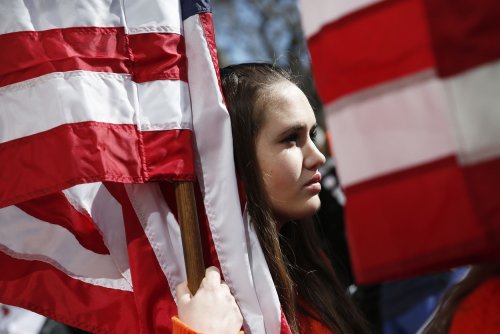WASHINGTON, March 4, 1933 (UP) - Franklin D. Roosevelt became President of the United States today with a demand for adequate but sound currency, an excoriation of the "money changers" and a promise that he might have to adopt war-time measures to combat the financial crisis now enveloping the nation.
"Practices of the unscrupulous money changers stand indicted in the court of public opinion," he declared and then set forth his lines of attack"
1-"There must be a strict supervision of all banking and credits and investments.
2-"There must be an end to speculation with other people's money;
3-"There must be provisions for an adequate but sound currency."
Detailed measures for fulfillment of this program he said he would urge upon a special session of the new Congress and ask the immediate assistance of the several States.
With uplifted hand, the advocate of the "New Deal" was sworn in by Chief Justice Hughes before 100,000 spectators in front of the Capitol.
As the solemn voice of the Chief Justice echoed across the vast throng, Mr. Roosevelt took from the shoulders of Herbert Hoover the heaviest burden of peace time responsibility that any President since Lincoln has faced. He repeated the oath in a firm, clear voice.
Then, speaking to the hushed thousands, Mr. Roosevelt spoke frankly of the "grim problem" facing the nation. The money changers he said, had fled from their high seats. Then he continued: --
"This nation asks for action, and action now."
He quieted the cheers with a broad wave of his hand, and told how he hoped prosperity could be restored in to the nation, which he said had lost confidence in itself through unreasoning fear.
The banking crisis, breaking as the climax of the long depression, threw a pall over the historic scene, though many of the throng still were unaware of the fact that protective bank closings had taken place almost all over the nation.
Biting raw winds swept the crowds. Cold gray skies chilled spectators who had been waiting for hours.
A few moments before Vice President Garner had been sworn inside the Senate Chamber with the outgoing and incoming Presidents, the Supreme Court, the old and new Cabinets, diplomats in their brilliant uniforms and hundreds of smartly dressed women in the galleries looking on.
Then Mr. Roosevelt and Mr. Hoover appeared on the high wooden stand erected against the east wall of the historic Capitol building. A white painted canopy, garlanded with laurel strands and decorated with American flags, and the cost of arms formed the setting for event.
Mrs. Roosevelt and Mrs. Hoover sat near each other during the ceremony. Practically every important figure in the old and new administrations, and of Congress, was gathered on the platform.
The President's inaugural address, brief but sharply serious in the face of the difficulties confronting him, handled the financial situation of the country without gloves.
He urged that American citizens go forward and make a trained and loyal army to make leadership effective.
"We, I know, are ready and willing to submit our lives and property to such discipline because it makes possible a leadership which aims at a larger good," Mr. Roosevelt declared.
If Congress refuses to put through measures deemed necessary, Mr. Roosevelt said, he would then seek broad emergency powers he had referred to.
He said, however, he hoped the normal balance between the executive and legislative authority might be adequate.
"But it may be that an unprecedented demand and need for undelayed action may call for a temporary departure from that normal balance of public procedure," the new President continued.
"I am prepared under my constitutional duty to recommend the measures that a stricken nation in the midst of a stricken world may require. These measures, or such other measures as the Congress may build out of its experience and wisdom, I shall seek within my constitutional authority, to bring to speedy adoption."
Cheers interrupted the President at this point.
Prosperity, he was confident, would return.
"This great nation will endure as it has endured, will revive and will prosper," President Roosevelt said.
The only thing this country has to fear, he added, is fear itself-unjustified terror which paralyzes effort.
Turning to foreign affairs he said he would dedicate the United States to the policy of a good neighbor, "the neighbor who resolutely respects himself and because he does so respects the rights of others-the neighbor who respects his obligations and respects the sanctity of his agreements in and with a world of neighbors."
After luncheon, the President accompanied by Mrs. Roosevelt and their son, James, received a tumultuous ovation as he took his place at 2:46 P. M., in the reviewing stand on Pennsylvania Ave. to witness the inaugural parade.
The parade, led by General Douglas MacArthur, Chief of Staff of the Army, started filing past the reviewing stand at 2:50 P. M.
The Army band, in full dress uniform, was followed by the massed flags of the forty-eight States. In a patriotic burst of fervor, the officials in the reviewing stand arose and cheered loudly as the flags passed.
While Mr. Roosevelt was reviewing the inaugural parade in front of the White House, members of his Cabinet were grouped in the rear, talking earnestly among themselves and glancing only occasionally at the display.














